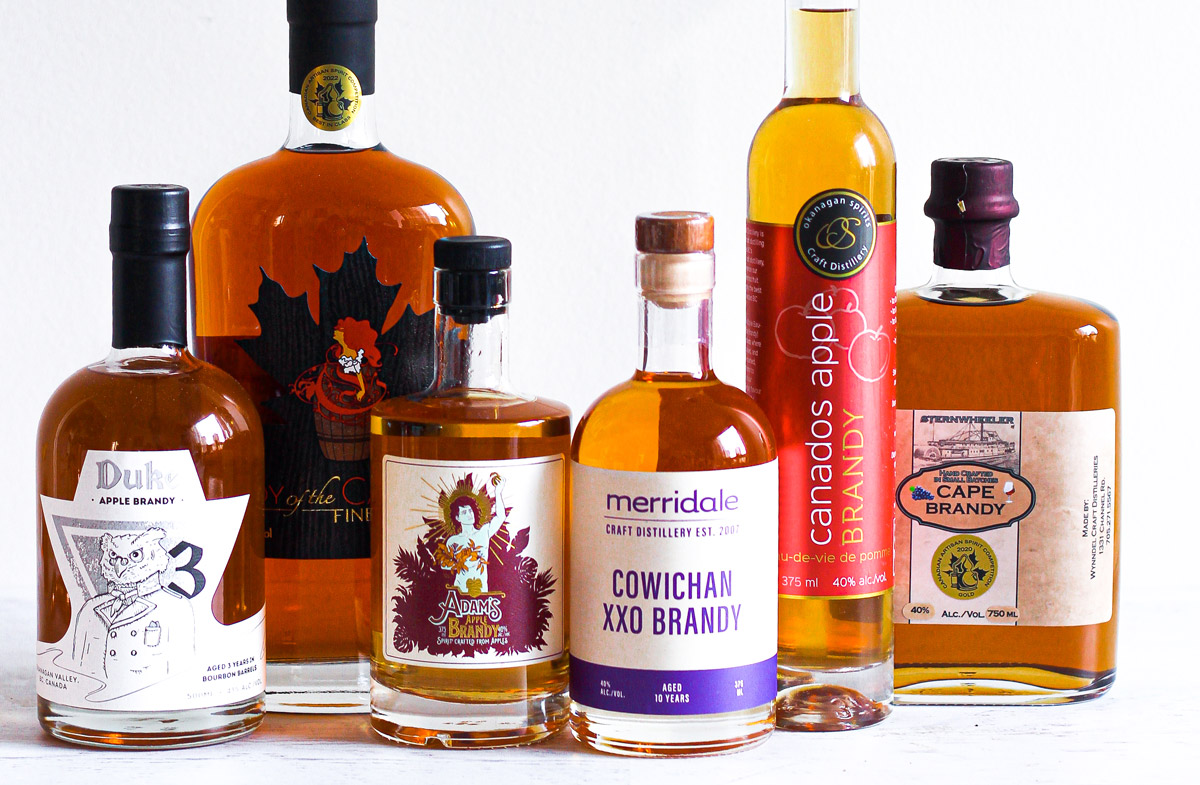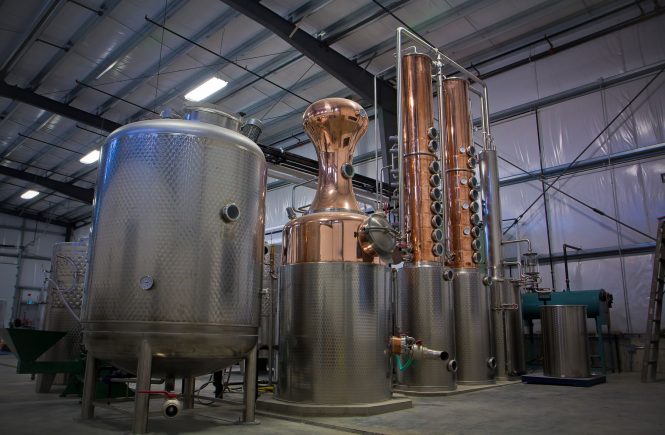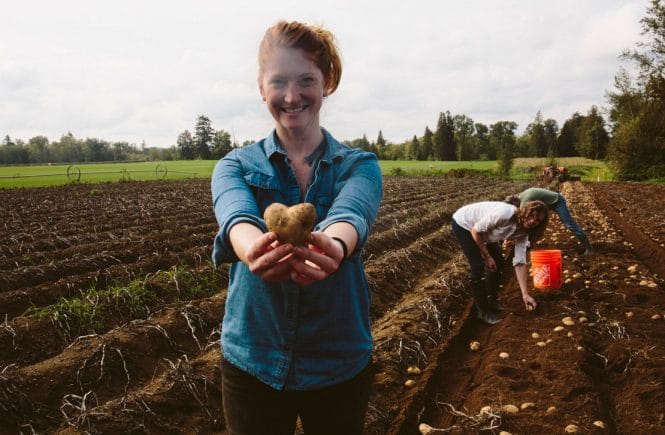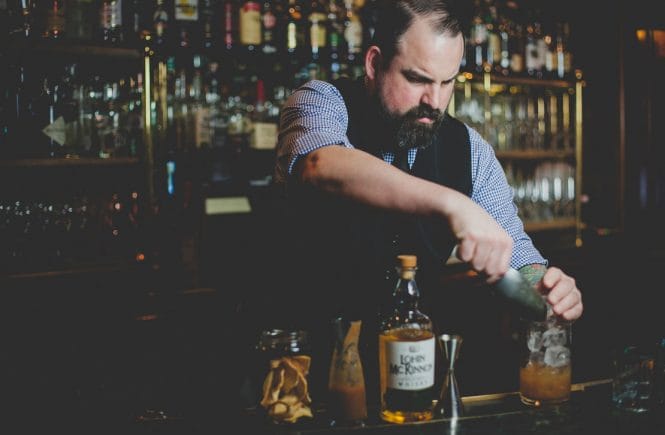B.C.’s craft distillers breathe new life into an old spirit

Over the last few decades, brandy has developed a branding problem. Not the Brandy who rose to fame with hits like The Boy is Mine in the late 1990s; rather, the once-venerable tipple that today is often seen as old fashioned, dull and enjoyed exclusively by the elderly.
Perhaps you’ve had it before in your grandma’s flamed Christmas pudding, drunk an occasional Sidecar at a hip cocktail spot or heard a reference to it in a Drake or Megan Thee Stallion song.
But outside of Cognac—a sub-category of brandy that has been embraced and promoted by the rap community—brandy has not been an intuitive or even conscious choice for most Gen Xers, millennials or Gen Zers.
Despite its waning popularity, there seems to be a trend emerging in British Columbia that just might clutch brandy out of the doldrums and back en vogue. Whether coincidental or created through circumstance, a number of B.C. wineries, cideries and distilleries have recently released their own small-batch, terroir-driven brandies—and they’re good, really good.
What Is Brandy?
To put it simply, brandy is a category of liquor that is made from distilled wine or other fermented fruit juices and bottled at no less than 40 per cent ABV. While it will possess aromatic and fruity notes, it will be dry in style.
The term “brandy” comes from the Dutch word “brandewijn,” which loosely translates to “burned wine.” Like tequila or rum, after brandy is distilled, it can be either bottled while young and vibrant or matured in wood barrels for an extended duration until rich and refined.
Brandy can be made anywhere in the world, but is particularly produced in large wine-making countries such as France, Spain, South Africa and the United States. As B.C. possesses a burgeoning wine industry and is also a large exporter of tree fruits, the province is primed to contend as a top brandy producer and has the capacity to make it “cool” again, thanks to modern craft distillers.
We’re really seeing two main styles emerge in B.C. that are somewhat reminiscent of France’s brandy industry, but with a local twist. There are some exceptions, such as Wynndel Craft Distilleries, which is producing brandies from many fruits like peaches and saskatoon berries, but for the most part (Wynndel Distilleries included), the B.C. industry is dominated with apple-based and grape-based expressions.
An Apple A Day…
With apples being B.C.’s biggest tree fruit crop by production volume, it’s hardly surprising that cideries and distilleries are utilizing this fruit as a raw ingredient for spirit production.
Okanagan Spirits, which opened in 2004, was one of the first distilleries to produce an apple brandy and smartly named their product Canados as a play on Calvados, a style of brandy made from apples in Normandy, France. Created using mostly Hyslop crabapples, a variety often used for making ciders due to its tartness and tannin levels, the Canados is aged in French oak for a minimum of three years before being bottled. This expression is extremely aromatic with notes of fresh red apples, oak tannins, baking spices and a long-lasting finish.
While Okanagan Spirits produces spirits from many different base ingredients, the Garden-of-Eden-inspired Forbidden Spirits makes all of their vodkas, gins and liqueurs from locally sourced apples. Therefore, releasing the aptly named Adam’s Apple Brandy was instinctive. Produced from 100 per cent estate-grown apples and aged in charred American oak casks, this expression is light, juicy and balanced—perfect for use in stirred down, spirit-forward cocktails.
Along similar lines, this year Alchemist Distiller released just over 600 bottles of Duke Apple Brandy, which is aged for three years in ex-bourbon barrels. This limited-edition brandy presents a harmonious combination of oak and fruit notes that work well as a spirit substitute in classic vodka or gin cocktails.
For something a bit more hard-core (apple pun intended), Wayward Distillery offers a limited-edition cask-strength apple brandy. The distillery is known for producing spirits made from honey, so apples are something of a departure; however, they utilize their ex-Drunken Hive Rum casks for maturation to produce a brandy that’s bold, spicy and “rich with an overabundance of personality,” as owner Dave Brimacombe notes.
Grape expectations
The eponymous Cognac and Armagnac brandies from France may be the most well-known styles of grape-based brandies in the world, but within B.C. a number of distilleries are reinventing these styles of spirits in a more approachable, yet still complex manner.
As noted by Maple Leaf Spirits, “If wine is the heart of the grape, brandy is the soul.” If this adage is true, then their Lady of the Cask brandy will be your kindred spirit. Made from grapes grown in the Okanagan and aged in European oak barrels for a minimum of six years (a similar aging period to a VSOP-designated Cognac), the complexity of this spirit spawns new tasting notes at each subsequent smell and sip. Aromas of tropical fruits, berries, butterscotch and almonds are followed by red apples, tobacco, Parma violet candy and toffee on the palate. The finish permeates with delight.
Similar to Maple Leaf Spirits, Merridale Cidery, located in the Cobble Hill, focuses on the terroir of the Cowichan Valley by using only local ingredients that are processed, fermented, distilled and bottled on their farm. Borrowing terminology from Cognac, their “hors d’âge” (which translates to “beyond age”) Cowichan XXO Brandy is single vineyard, single batch, single barrel and aged for a minimum of 10 years in new French oak barrels. Where XO-designated Cognacs carry a price tag of $200 or more, this local expression can be found in half-sized (375 mL) bottles for under $50. Expect intense vanilla and toasted cedar notes, with red apples, cinnamon, white pepper and brown sugar dancing on your palate.
All in all, whether you’re partial to lighter, unaged spirits like vodka and gin, or prefer the bolder, more mature tastes of darker spirits like whisky and rum, the category of brandy is the perfect middle ground for all imbibers as it offers something for everyone.
With B.C. distillers producing excellent quality, locally inspired iterations, there is enormous potential for the category to be prolific once again. Perhaps creating a new (unofficial) name and identity for it in B.C. is a good start to the category’s rebranding—Caniac, anyone?
—by Reece Sims




